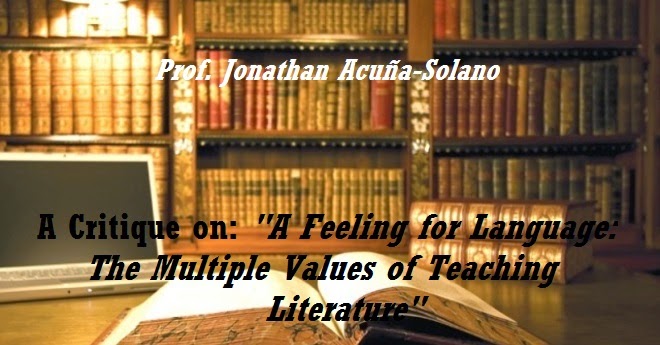A Critique on
“A Feeling for Language: The Multiple
Values of Teaching Literature”
By Prof.
Jonathan Acuña Solano
Tuesday,
May 5, 2015
Twitter:
@jonacuso
Post 163
The
teaching of literature in EFL/ESL contexts has never been favored if compared
to other language skills or sub-skills. As Long (1986) puts it, “the teaching
of literature has lacked a consistent methodology for presentation to
non-native speakers.” And this is still evident in certain ways in which new
literature instructors posit the teaching of literature by means of “second-hand
responses” (Long, 1986), as if non-native speakers lack the ability to provide
criticism and were only able to state what others have already commented on a
given piece of literature.
Long
(1986) critiques the pervasive ways of approaching literature teaching to
simply circumscribe it to the “nineteenth-century survival” way of spotting
“similes, metaphors, and so on.” Long proposes a different approach to
literature in EFL/ESL contexts because these students cannot be paralleled with
the native ones. That is, he insists on the necessity to differentiate the way
literature is taught in ELT as cases of “text(s)-as-object,” as it regularly
happens in EFL/ESL textbooks.
 Though
Long does not exactly state that the “literary text invites ‘high-order’
questions while [the] non-literary texts presupposes ‘low-order’ questions”
(Long 1986), it is important to treat the literary text differently from the
reading learners do in regular English-learning textbooks. The ‘high-order
questions’ can serve different purposes, but its main one is connected to aid
the learner/reader “to get an insight into the text which might not be possible
otherwise” (Long 1986). Literature teaching should be aimed at helping the
student to verbally and creatively respond to a literary text by means of the
instructor’s help. As Long (1986) suggests, the teaching of literature should
be a multi-directional mode of presentation.
Though
Long does not exactly state that the “literary text invites ‘high-order’
questions while [the] non-literary texts presupposes ‘low-order’ questions”
(Long 1986), it is important to treat the literary text differently from the
reading learners do in regular English-learning textbooks. The ‘high-order
questions’ can serve different purposes, but its main one is connected to aid
the learner/reader “to get an insight into the text which might not be possible
otherwise” (Long 1986). Literature teaching should be aimed at helping the
student to verbally and creatively respond to a literary text by means of the
instructor’s help. As Long (1986) suggests, the teaching of literature should
be a multi-directional mode of presentation.
“The
whole emphasis” of teaching literature must be “on the learning rather than the
teaching” (Long 1986). Instructors have been more concerned with how they are
going to teach in their literature class than with what it is that students are
going to learn and why. The “response channels” stated by Long (1986) need to
be open so students can cognitively interact with the literary piece to first
verbally respond to it, and then allow their creativity interact with the piece
and produce their own interpretations once their comprehension has been
nurtured by the instructor.
Long,
M. (1986). A Feeling for Language: The
multiple values of teaching literature. Literature and Language Teaching.
Edited by Brumfit & Carter. Oxford: OUP










Post a Comment